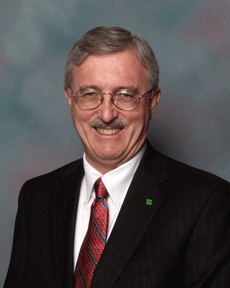Equipment finance trends in government

Govpro checked in with Thomas B. Howard Jr., director of government finance at Cherry Hill, N.J.-based TD Equipment Finance (TDEF), to find out about equipment financing trends for governments in 2012. The company offers an array of equipment financing programs that can be an alternative to traditional financing. Howard is based in TD’s offices in Vienna, Va.
Govpro: What are the highlights of equipment finance and leasing trends for state and local governments this year?
Thomas B. Howard Jr.: There seems to be a real split in current activity based on size of the municipal entity and their capital equipment leasing in calendar 2012.
Smaller credit-worthy municipal entities are still using our equipment finance and lease products to help provide the capital equipment that they absolutely need and had plans to acquire during the year. These municipal entities normally keep equipment as long as it is providing needed utility value and is not too costly to operate. The replacement cycle is not predetermined, and there continues to be a fairly normal level of financing requests for proposals (RFPs) in this municipal leasing market.
Larger credit-worthy municipal entities have changed their buying and financing patterns in the past two years from a planned replacement cycle on most equipment (example: school buses replaced every 10 years, one-tenth each year) to stretching the years of the replacement cycle timing or simply not replacing at this time. Capital equipment financing budgets and RFPs are reduced by half or more with many of these larger cities and counties. This has resulted in fewer RFP dollars requested for capital equipment financing from these larger entities, lower use of their existing master financing programs, and more competition among our financial peer group for the new RFPs that do get out to the lease market for bid.
We expect this buying and financing trend for lower overall requests and heavy competition for quality transactions to continue with the bigger municipal users throughout 2012.
The need in the financial markets for high-quality transactions and the lessons learned from the liquidity crunch several years ago have made the low-credit-quality municipality requests very expensive or not really attainable at all. This may change somewhat in 2012 as these weaker municipalities either clean up their financial condition and ratings or get taken over by a governing municipal entity that cleans up the problems and maintains performance control of the weaker entity.
Govpro: What equipment or product categories will stand out in the finance/leasing market in 2012?
TBH: The main areas of new or continued strength are very sensible and easily defended in today’s heavily monitored municipal world.
Public safety will continue to be a strong category. Fire and rescue equipment, 911 system upgrades and first responder equipment, and other important communication projects are continuing to provide opportunities for our financing products. This trend will continue.
Improving public transportation equipment may also present more opportunities in 2012.
Information technology equipment; better, more effective software; and data retention and transmission infrastructure will continue to be important in 2012.
Education-related equipment, particularly computer equipment, will continue to be well-supported.
Financing of energy savings improvement contracts for municipal buildings and infrastructure also will continue through 2012.
Since its inception in 2001, TDEF has funded more than $425 million in leases for municipal customers and prospects of TD Bank. TDEF offers tax-exempt leases to municipalities and school districts that leverage tax benefits of the lease for the benefit of the municipal lessee in the form of reduced lease rates. Some of TDEF’s municipal lease focus areas include schools, fire/rescue equipment, public works and waste management.
Thomas B. Howard Jr., CPA, is TDEF’s vice president, Federal Leasing. He has been with TDEF since February 2007 and has been in the equipment finance and specialty lending industry for more than 35 years. Howard earned his undergraduate degree in accounting at the University of Maryland and has an MBA in finance from Loyola College.




















